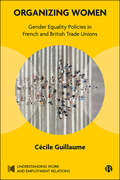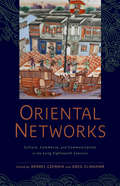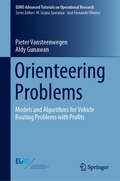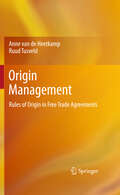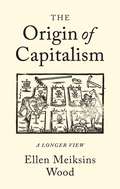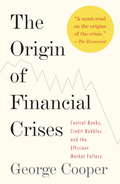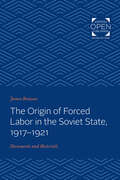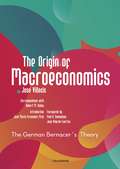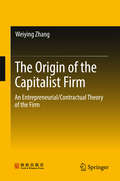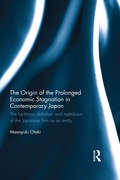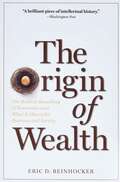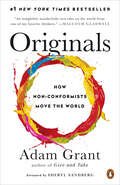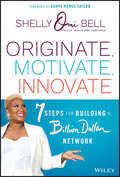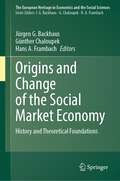- Table View
- List View
Organizing Women: Gender Equality Policies in French and British Trade Unions (Understanding Work and Employment Relations)
by Cécile GuillaumeThis book explores the representation of women and their interests in the world of work across four trade unions in France and the UK. Drawing on case studies of the careers of 100 activists and a longitudinal study of the trade unions' struggle for equal pay in the UK, it unveils the social, organizational, and political conditions that contribute to the reproduction of gender inequalities or, on the contrary, allow the promotion of equality. Guillaume’s nuanced evaluation is a call to redefine the role of trade unions in the delivering of gender equality, contributing to broader debates on the effectiveness of equality policies and the enforcement of equality legislation.
Organs for Sale: Bioethics, Neoliberalism, and Public Moral Deliberation
by Ryan GillespieOrgans for Sale is a study of the bioethical question of how to increase human organ supply. But it is also an inquiry into public moral deliberation and the relationship between economic worth and the value systems of a society. Looking closely at human organ procurement debates, the author offers a critique of neoliberalism in bioethics and asks what kind of society we truly want. While society has shown concern over debates surrounding organ procurement, a better understanding of the rhetoric of advocates and philosophical underpinnings of the debate might indeed improve our public moral deliberation in general and organ policy more specifically. Examining public arguments, this book uses a range of source material, from medical journals to congressional hearings to newspaper op-eds, to provide the most up-to-date and thorough analysis of the topic. Organs for Sale posits that deciding together on the limits of markets, and on what is and ought to be for sale, sheds light on the moral fibre of our society and what it needs to thrive.
ORGB
by Debra L. NelsonLearn Organizational Behavior YOUR Way with ORGB! ORGB's easy-reference, paperback textbook presents course content through visually engaging chapters as well as Chapter Review Cards that consolidate the best review material into a ready-made study tool. With the textbook or on its own, ORGB Online allows easy exploration of ORGB anywhere, anytime--including on your device! Collect your notes, browse interactive content and create StudyBits as you go to remember what's important. Then, either use preset study resources or personalize the product through easy-to-use tags and filters to prioritize your study time. Make and review flashcards, review related content and track your progress with Concept Tracker--all in one place and at an affordable price!
Orgullo enfermero: Ni héroes ni villanos, lo que siempre fuimos
by Enfermera SaturadaEl testimonio de cómo las enfermeras luchamos contra un virus que paralizó al mundo. 2020 fue el Año Internacional de las Enfermeras. Lo celebramos de un modo extraño y al que no estamos acostumbradas: luchando contra el coronavirus debajo de un EPI, siendo protagonistas en los balcones de cada casa, en los medios de comunicación y, finalmente, en los centros de vacunación. No hubo fiestas ni actos especiales en nuestro año ni en el siguiente, pero sí hubo un sentimiento de orgullo por saber que estábamos haciendo historia. Siempre habíamos estado ahí, pero pocas veces se nos había visto tanto. También seguiremos estando cuando se apaguen los focos. Esta es la historia de todo lo que sucedió después de la primera ola, cuando veíamos con desesperación cómo la Covid-19 volvía a llenar hospitales, de una pandemia que jamás olvidaremos y de la campaña de vacunación más grande que la humanidad ha vivido. Millones de dosis de esperanza administradas con orgullo por enfermeros y enfermeras alrededor del mundo, los mismos que primero lucharon armados con bolsas de basura y que lo hicieron después con una jeringuilla en la mano. Esta es la historia de una enfermera que luchó contra el coronavirus en primera línea, armada con una bolsa de basura y una mascarilla reutilizada. Pero, en realidad, es también la de todos los enfermeros y las enfermeras que plantaron cara al virus, esos a los que la sociedad llamó héroes, y por quienes aplaudía a las ocho, mientras ellos y ellas vivían con el miedo pegado a su espalda. Es el testimonio de sus lágrimas, temores y sacrificios, y a la vez de la inmensa felicidad que sentían cada vez que apagaban un respirador y entregaban el alta a un paciente. "El testimonio de cómo las enfermeras vivimos los días en que un virus paralizó el mundo en poco más de tres meses y sumió a España en la peor pandemia del siglo XXI."
Orient-Express Hotels
by Frances X. Frei Corey HajimDescribes how a hotel and leisure company provides high-end service through its distinctive hotels and trains. Provides an opportunity to learn about the company's unusual quality practices and puts into doubt the unquestioned use of well-known practices, such as managing for consistency, offering incentives based on nonfinancial measures, and creating a unified message for a high-end brand. The main dilemma is whether the company should develop a loyalty program across its collection of hotels.
Oriental Land Co., Ltd. -Tokyo Disney Resort
by Akiko Kanno Ramon Casadesus-MasanellThis case describes the history of Oriental Land Co. Ltd.'s (OLC's) Tokyo Disney Resort (TDR), its operations, the extent of vertical integration, and the challenges it faced in 2018, as OLC's chairman and CEO, Toshio Kagami, contemplated how best to deal with congestion in the park. As of 2018, Tokyo Disneyland and Tokyo DisneySea, the two parks that comprised TDR, were the only Disney parks not owned and operated by Disney. Instead, OLC paid royalties to Disney based on the parks' revenue (in yen). The parks were immensely popular, but OLC had begun to see lower customer satisfaction ratings in recent years as high attendance led to long wait times. Although it continuously added new attractions to TDR, the company now faced a dilemma regarding how to expand further, given the limited land available around the parks. Kagami also considered whether to focus on OLC's other businesses, such as hotels, and even its nascent agriculture business, which it used to grow food served in the two parks.
Oriental Networks: Culture, Commerce, and Communication in the Long Eighteenth Century (Aperçus: Histories Texts Cultures)
by Bärbel Czennia Greg Clingham Richard Coulton Stephanie Howard-Smith Samara Anne Cahill Jennifer L. Hargrave James Watt Kevin L. CopeOriental Networks explores forms of interconnectedness between Western and Eastern hemispheres during the long eighteenth century, a period of improving transportation technology, expansion of intercultural contacts, and the emergence of a global economy. In eight case studies and a substantial introduction, the volume examines relationships between individuals and institutions, precursors to modern networks that engaged in forms of intercultural exchange. Addressing the exchange of cultural commodities (plants, animals, and artifacts), cultural practices and ideas, the roles of ambassadors and interlopers, and the literary and artistic representation of networks, networkers, and networking, contributors discuss the effects on people previously separated by vast geographical and cultural distance. Rather than idealizing networks as inherently superior to other forms of organization, Oriental Networks also considers Enlightenment expressions of resistance to networking that inform modern skepticism toward the concept of the global network and its politics. In doing so the volume contributes to the increasingly global understanding of culture and communication. Published by Bucknell University Press. Distributed worldwide by Rutgers University Press.
Orientation to the Public Image Assessment Exercise
by Robin J. ElyThe Public Image Assessment exercise acquaints students with the ideal images they hold of themselves, the actions they engage in to convey these images, and the benefits and costs of these behaviors to themselves and to others. Social psychologists call this process impression management. Although managing others' impressions of us is a natural part of life--and there are good, pragmatic reasons for being concerned with the images we present to others--problems arise when people are driven by concerns about others' assessments of them. When the goal of validating one's image becomes more important than others, the task, or a group's mission, it becomes difficult to learn, take risks, and experiment.
Orientation to the Subarctic Survival Situation
by Linda A. Hill Katherine S. WeberAn orientation to the "Subartic Survival Situation" (designed by and available from Human Synergistics, Inc., Plymouth, MI, tel. 313-459-1030), an experiental exercise that gives students an opportunity to learn about their personal influence style and their effectiveness as a team leader or member. As a simulation, the exercise provides conditions analogous to those managers face every day: They must make critical decisions from incomplete and often ambiguous information and must live with imperfect solutions; the problem is urgent and they have to cope with the stresses and emotions associated with working under pressure; they will have to work with others to solve a common problem (in this regard, this exercise perhaps simulates most closely a newly instituted cross-functional task force). Outlines the rationale for the exercise and gives a brief overview of how the simulation will unfold.
Orienteering Problems: Models and Algorithms for Vehicle Routing Problems with Profits (EURO Advanced Tutorials on Operational Research)
by Pieter Vansteenwegen Aldy GunawanThis tutorial introduces readers to several variants of routing problems with profits. In these routing problems each node has a certain profit, and not all nodes need to be visited. Since the orienteering problem (OP) is by far the most frequently studied problem in this category of routing problems, the book mainly focuses on the OP. In turn, other problems are presented as variants of the OP, focusing on the similarities and differences. The goal of the OP is to determine a subset of nodes to visit and in which order, so that the total collected profit is maximized and a given time budget is not exceeded.The book provides a comprehensive review of variants of the OP, such as the team OP, the team OP with time windows, the profitable tour problem, and the prize-collecting travelling salesperson problem. In addition, it presents mathematical models and techniques for solving these OP variants and discusses their complexity. Several simple examples and benchmark instances, together with their best-known results, are also included. Finally, the book reviews the latest applications of these problems in the fields of logistics, tourism and others.
Origin Management: Rules of Origin in Free Trade Agreements
by Ruud Tusveld Anne van de HeetkampOrigin Management describes a holistic approach that allows internationally operating companies to benefit from reduced import duty rates within Free Trade Agreements (FTAs). Through the creation of a single, auditable, and global platform, companies are enabled to successfully claim preferential origin and sustain, review and audit preferential treatment claims. Seeking to provide a comprehensive treatment of origin management for a professional audience, this book outlines the underlying theoretical concepts and legislative frameworks, and presents practical implications and guidelines for a successful origin management program as part of a strategic sourcing initiative. The authors advocate an approach that involves sharing and distributing information and resources throughout the company and the supply chain, resulting in competitive advantages, synergies, and a central information point for all origin associated issues.
The Origin of Brands
by Laura Ries Al RiesWhat Charles Darwin did for biology, Al and Laura Ries do for branding. In their exciting new book, The Origin of Brands, the Rieses take Darwin's revolutionary idea of evolution and apply it to the branding process. What results is a new and strikingly effective strategy for creating innovative products, building a successful brand, and, in turn, achieving business success. Here, the Rieses explain how changing conditions in the marketplace create endless opportunities to build new brands and accumulate riches. But these opportunities cannot be found where most people and most companies look. That is, in the convergence of existing categories like television and the computer, the cellphone and the Internet. Instead, opportunity lies in the opposite direction--in divergence. By following Darwin's brilliant deduction that new species arise from divergence of an existing species, the Rieses outline an effective strategy for creating and taking to market an effective brand. In The Origin of Brands, you will learn how to: Divide and conquer Exploit divergence Use the theories of survival of the firstest and survival of the secondest Harness the power of pruning Using insightful studies of failed convergence products and engaging success stories of products that have achieved worldwide success through divergence, the Rieses have written the definitive book on branding. The Origin of Brands will show you in depth how to build a great brand and will lead you to success in the high-stakes world of branding.
The Origin of Capitalism: A Longer View
by Ellen Meiksins WoodIn this original and provocative book Ellen Meiksins Wood reminds us that capitalism is not a natural and inevitable consequence of human nature, nor is it simply an extension of age-old practices of trade and commerce. Rather, it is a late and localized product of very specific historical conditions, which required great transformations in social relations and in the human interaction with nature. This new edition is substantially revised and expanded, with extensive new material on imperialism, anti-Eurocentric history, capitalism and the nation-state, and the differences between capitalism and non-capitalist commerce. The author traces links between the origin of capitalism and contemporary conditions such as 'globalization', ecological degradation, and the current agricultural crisis.
The Origin of Financial Crises
by George CooperIn a series of disarmingly simple arguments financial market analyst George Cooper challenges the core principles of today's economic orthodoxy and explains how we have created an economy that is inherently unstable and crisis prone. With great skill, he examines the very foundations of today's economic philosophy and adds a compelling analysis of the forces behind economic crisis. His goal is nothing less than preventing the seemingly endless procession of damaging boom-bust cycles, unsustainable economic bubbles, crippling credit crunches, and debilitating inflation. His direct, conscientious, and honest approach will captivate any reader and is an invaluable aid in understanding today's economy.From the Trade Paperback edition.
The Origin of Forced Labor in the Soviet State, 1917-1921: Documents and Materials
by James BunyanOriginally published in 1967. Many documents essential for understanding the development of Soviet labor policies from 1917 to 1921 have been selected, translated, and presented in this volume. The Origin of Forced Labor in the Soviet State, 1917-1921 begins with the early months of the revolution, when the utopian slogans of workers' control of industry and the promise of trade-union management of industrial production were the controlling factors in shaping Soviet policy on labor. Chapter 2 traces the gradual introduction of measures of labor compulsion, first in relation to those the Bolsheviks classified as the bourgeoisie and afterwards in relation to the working class. Chapters 3 through 5, the core of the study, tell the story of labor militarization—the new formula that, for the Communists, held the key to solving all economic problems in a socialist state. Chapter 3 presents the theories used to justify the militarization of labor and outlines the institutional framework that kept the system in operation. Chapter 4 deals with the application of this system to different segments of the Russian population. Chapter 5 analyzes compulsory labor in transportation, in which the validity of labor militarization as an institution came most sharply into question. The last chapter reviews the general crisis of Russian Communism, the repudiation of some of the most oppressive features of that system, and the efforts to reconcile conflicting views within the Communist Party on the role of labor under socialism.
The Origin of Macroeconomics: The German Bernacer´s Theory
by José Villacís GonzálezThe true origin of macroeconomics. This book details an unprecedented finding in the history of economic thought: the true origin of macroeconomics. This occurred in Spain with the researcher Germán Bernácer (Alicante 1883-1965) and his first book: Sociedad y Felicidad. Un Ensayo de Mecánica Social (Society and Happiness. An Essay on Social Mechanics), published in 1916. Twenty years before the publication of The General Theory of Employment, Interest and Money (1936) by Keynes, Bernácer established the fundamental pillars of macroeconomics. Some of these works came to the attention of Professor Robertson in Cambridge where Keynes worked. Villacís demonstrates the invalidity of the fundamental equation of macroeconomics: savings equal to investment. This book discusses the epistolary relationship of the author, José Villacís, with Professor Robert M. Solow.
The Origin of the Capitalist Firm
by Weiying ZhangThe book addresses the entrepreneurial origin of the capitalist firm and its asymmetric contractual relationships between capitalists, workers, managers and entrepreneurs, and explains the origin of the firm by focusing on entrepreneurship. A hidden action model shows how assigning residual claim to entrepreneurs can provide a better overall incentive; a hidden information model demonstrates that entrepreneurs are given priority and have authority to select the management, because being wealthy is a more important factor than ability; and a general equilibrium entrepreneurial model shows that the equilibrium relationships between different members of the firm depend on the joint distribution of ability, wealth and risk attitudes in the population. Overall, the book reveals that the capitalist firm is more efficient, not only because it provides better incentives but also because it ensures that the most entrepreneurial people control the firm.
The Origin of the Prolonged Economic Stagnation in Contemporary Japan: The factitious deflation and meltdown of the Japanese firm as an entity
by Masayuki OtakiThe deflationary Japanese economy is a spurious observation and a precarious political propaganda, which tacitly connects with the fanatic diagnosis urging an inflation-prompting macroeconomic policy. This book provides an overview of the prolonged stagnation of the current Japanese economy. It also examines the politico-economic implications concerning the precarious conversion of Japanese monetary policy and focuses on the vulnerability of the price-sustaining policy concerning the public debt. The book also analyzes and suggests against the acceleration of inflation under the current Japanese foreign exchange system and also suggests that the surge of foreign direct investment towards East Asia is the acute cause of Japanese economy stagnation. The book concludes that to rebuild the economic potential of the Japanese economy, education and fostering the youths are the keys. This book will definitely interest those who are keen to learn more about the relationship between Bank of Japan and the Japanese political parties.
The Origin of Wealth: The Radical Remaking of Economics and What it Means for Business and Society
by Eric D. BeinhockerOver 6.4 billion people participate in a $36.5 trillion global economy, designed and overseen by no one. How did this marvel of self-organized complexity evolve? How is wealth created within this system? And how can wealth be increased for the benefit of individuals, businesses, and society? In The Origin of Wealth, Eric D. Beinhocker argues that modern science provides a radical perspective on these age-old questions, with far-reaching implications. According to Beinhocker, wealth creation is the product of a simple but profoundly powerful evolutionary formula: differentiate, select, and amplify. In this view, the economy is a "complex adaptive system" in which physical technologies, social technologies, and business designs continuously interact to create novel products, new ideas, and increasing wealth. Taking readers on an entertaining journey through economic history, from the Stone Age to modern economy, Beinhocker explores how "complexity economics" provides provocative insights on issues ranging from creating adaptive organizations to the evolutionary workings of stock markets to new perspectives on government policies. A landmark book that shatters conventional economic theory, The Origin of Wealth will rewire our thinking about how we came to be here--and where we are going.
The Original Has This Signature--W. K. Kellogg
by Horace B. PowellThe Story of a Pioneer in Industry and Philanthropy--W. K. Kellogg,who built a world-wide cereal industry and amassed one of the great fortunes of the twentieth century and reinvested his fortune in a philanthropic foundation designed to help people to help themselves.
Original Sin and Procylical Fiscal Policy: Two Sides of the Same Coin?
by Gustavo AdlerA report from the International Monetary Fund.
Originals: How Non-Conformists Move the World
by Sheryl Sandberg Adam Grant<P>With Give and Take, Adam Grant not only introduced a landmark new paradigm for success but also established himself as one of his generation’s most compelling and provocative thought leaders. In Originals he again addresses the challenge of improving the world, but now from the perspective of becoming original: choosing to champion novel ideas and values that go against the grain, battle conformity, and buck outdated traditions. How can we originate new ideas, policies, and practices without risking it all? <P>Using surprising studies and stories spanning business, politics, sports, and entertainment, Grant explores how to recognize a good idea, speak up without getting silenced, build a coalition of allies, choose the right time to act, and manage fear and doubt; how parents and teachers can nurture originality in children; and how leaders can build cultures that welcome dissent. <P>Learn from an entrepreneur who pitches his start-ups by highlighting the reasons not to invest, a woman at Apple who challenged Steve Jobs from three levels below, an analyst who overturned the rule of secrecy at the CIA, a billionaire financial wizard who fires employees for failing to criticize him, and a TV executive who didn’t even work in comedy but saved Seinfeld from the cutting-room floor. The payoff is a set of groundbreaking insights about rejecting conformity and improving the status quo. <P><b>A New York Times Bestseller</b>
Originate, Motivate, Innovate: 7 Steps for Building a Billion Dollar Network
by Shelly Omilade BellSupercharge your business or career by staying true to your authentic self In Originate, Motivate, Innovate: 7 Steps to Building a Billion Dollar Network, accomplished entrepreneur Shelly Omilâdé Bell and author Sheena C. Howard deliver an honest and engaging discussion of how to think differently about getting your business funded as a female entrepreneur of color. In the book, you’ll find the mindsets, tools, tactics, and strategies you need to succeed in a venture capital environment that is largely designed by—and for—white males. You’ll learn how to apply your own unique story and background and prioritize valuable relationships to create your own pathway to a fully funded business. You’ll also discover: An acknowledgment and highlighting of those obstacles that remain in place and stand in the way of women of color in business How to break through those obstacles while doing things your own way Strategies for achieving your next goal, whether that’s building a business, creating social impact, or looking for a raise An essential and insightful resource for entrepreneurs, founders, and other business leaders of color, Originate, Motivate, Innovate is the no-nonsense, hands-on book that professional women of color have been waiting for.
Origins and Change of the Social Market Economy: History and Theoretical Foundations (The European Heritage in Economics and the Social Sciences #26)
by Jürgen G. Backhaus Günther Chaloupek Hans A. FrambachThis edited volume addresses the theoretical and historical foundations of the German Social Market Economy. Written to commemorate the 75th anniversary of the establishment of the Social Market Economy, chapter contributions discuss the ideas of its theoretical founders—Walter Eucken, Alfred Müller-Armack, Wilhelm Röpke, and Franz Böhm--as well as related influences such as Ordoliberalism, the historical school of economics, and the Catholic social doctrine. In addition, chapters analyze differences and parallels to alternative policy concepts, in particular Keynesianism. Finally, the volume turns toward contemporary discussions of the Social Market Economy in the present political and economic context, specifically its ability to cope with current challenges. Providing rich context for the establishment of Germany’s contemporary economic system, this volume will be of interest to researchers and students of political, social and economic systems, the history of economic thought, and political history.
The Origins and Consequences of Property Rights: Austrian, Public Choice, and Institutional Economics Perspectives (Elements in Austrian Economics)
by Colin Harris Meina Cai Ilia Murtazashvili Jennifer MurtazashviliProperty rights are the rules governing ownership in society. This Element offers an analytical framework to understand the origins and consequences of property rights. It conceptualizes of the political economy of property rights as a concern with the follow questions: What explains the origins of economic and legal property rights? What are the consequences of different property rights institutions for wealth creation, conservation, and political order? Why do property institutions change? Why do legal reforms relating to property rights such as land redistribution and legal titling improve livelihoods in some contexts but not others? In analyzing property rights, the authors emphasize the complementarity of insights from a diversity of disciplinary perspectives, including Austrian economics, public choice, and institutional economics, including the Bloomington School of institutional analysis and political economy.
